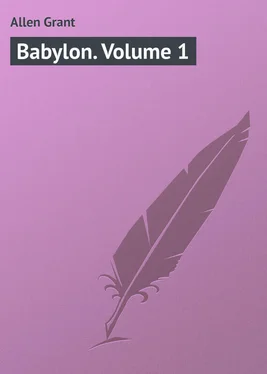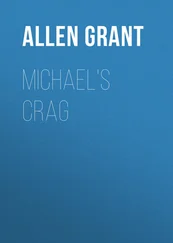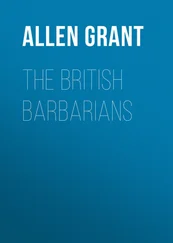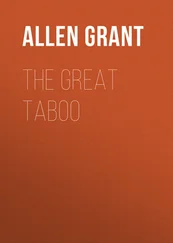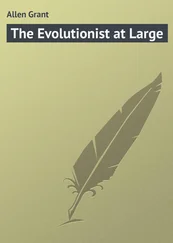Grant Allen - Babylon. Volume 1
Здесь есть возможность читать онлайн «Grant Allen - Babylon. Volume 1» — ознакомительный отрывок электронной книги совершенно бесплатно, а после прочтения отрывка купить полную версию. В некоторых случаях можно слушать аудио, скачать через торрент в формате fb2 и присутствует краткое содержание. ISBN: , Жанр: foreign_prose, на английском языке. Описание произведения, (предисловие) а так же отзывы посетителей доступны на портале библиотеки ЛибКат.
- Название:Babylon. Volume 1
- Автор:
- Жанр:
- Год:неизвестен
- ISBN:http://www.gutenberg.org/ebooks/47431
- Рейтинг книги:5 / 5. Голосов: 1
-
Избранное:Добавить в избранное
- Отзывы:
-
Ваша оценка:
- 100
- 1
- 2
- 3
- 4
- 5
Babylon. Volume 1: краткое содержание, описание и аннотация
Предлагаем к чтению аннотацию, описание, краткое содержание или предисловие (зависит от того, что написал сам автор книги «Babylon. Volume 1»). Если вы не нашли необходимую информацию о книге — напишите в комментариях, мы постараемся отыскать её.
Babylon. Volume 1 — читать онлайн ознакомительный отрывок
Ниже представлен текст книги, разбитый по страницам. Система сохранения места последней прочитанной страницы, позволяет с удобством читать онлайн бесплатно книгу «Babylon. Volume 1», без необходимости каждый раз заново искать на чём Вы остановились. Поставьте закладку, и сможете в любой момент перейти на страницу, на которой закончили чтение.
Интервал:
Закладка:
They had gathered flowers till they were tired of them in the broad spongy meadow; they had played hide-and-seek among the eighteenth-century tombstones in the big old churchyard; they had quarrelled and made it up again half a dozen times over in pure pettishness: and now, by way of a distraction, Minna said at last coaxingly: ‘Do ‘ee, Colin, do ‘ee come down to the lake yonder and make I a bit of a vigger-’ead.’
‘Don’t ‘ee worrit me, Minna,’ Colin answered, like a young lady who refuses to sing, half-heartedly (meaning all the time that one should ask her again): ‘Don’t ‘ee see I be tired? I don’t want vor to go makin’ no vigger-’eads vor ‘ee, I tell ‘ee.’
But Minna would have one: on that she insisted: ‘What a vinnid lad ‘ee be,’ she cried petulantly, ‘not to want to make I a vigger-’ead. Now do ‘ee, Cohn, ther’s a a good boy; do ‘ee, an’ I’ll gee ‘ee ‘arf my peppermint cushions, come Saturday.’
‘I don’t want none o’ your cushions, Minna,’ Colin answered, with a boy’s gallantry; ‘but come along down to the lake if ‘ee will: I’ll make ‘ee dree or vower vigger-’eads, never vear, an’ them vine uns too, if so be as you want ‘em.’
They went together down to the brook at the corner of the meadow (called a lake in the Dorsetshire dialect); and there, at a spot where the plastic clay came to the surface in a little cliff at a bend of the stream, Colin carved out a fine large lump of shapeless raw material from the bank, which he forthwith proceeded to knead up with his hands and a sprinkling of water from the rill into a beautiful sticky consistency. Minna watched the familiar operation with deepest interest, and added from time to time a word or two of connoisseur criticism: ‘Now thee’st got it too wet, Colin;’ or, ‘Take care thee don’t putt in too much of thik there blue earth yonder; or, ‘That’s about right vor the viggeread now, I’m thinkin’; thee’d better begin makin’ it now avore the clay gets too dried up.’
As soon as Colin had worked the clay up to what he regarded as the proper requirements of his art, he began modelling it dexterously with his fingers into the outer form and fashion of a ship’s figure-head: ‘What’ll ‘ee ‘ave virst, Minna?’ he asked as he roughly moulded the mass into a bold outward curve, that would have answered equally well for any figure-head in the whole British merchant navy.
‘I’ll ‘ave the Mariar-Ann,’ Minna answered with a nod of her small black head in the direction of the mouth in the valley, where the six petty fishing vessels of Wootton Mandeville stood drawn up together in a long straight row on the ridge of shingle. The Mariar-Ann was the collier that came monthly from Cardiff, and its figure-head represented a gilded lady, gazing over the waves with a vacant smile, and draped in a flowing crimson costume of no very particular historical period.
Cohn worked away at the clay vigorously for a few minutes with fingers and knife by turns, and at the end of that time he had produced a very creditable figure-head indeed, accurately representing in its main features the gilded lady of the Mariar-Ann.
‘Oh, how lovely!’ Minna cried, delighted. ‘Thik’s the best thee’st made, Colin. Let’s bake un and keep un always.’
‘Take un ‘ome an’ bake un yourself, Minna,’ the boy answered. ‘We ain’t got no vire ‘ere. What’ll I make ‘ee now? ‘Nother vigger-’ead?’
‘No!’ Minna cried, with a happy inspiration.
‘Make myself, Colin.’
The boy eyed her carefully from head to foot. ‘I don’t s’pose I can do ‘ee, Minna,’ he answered after a pause. ‘Howsonedever, I’ll try;’ and he took a fresh lump of the kneaded clay, and began working it up loosely into a rough outline of the girl’s figure. It was his first attempt at modelling from life, and he went at it with careful deliberation. Minna posed before him in her natural attitude, and Colin called her back every minute or two when she got impatient, and kept his little sitter steadily posed till the portrait statuette was fairly finished. Critical justice compels the admission that Colin Churchill’s first figure from life was not an entirely successful work of sculpture. Its expression was distinctly feeble; its pose was weak and uncertain; its drapery was marked by a frank disregard of folds and a bold conventionalism; and, last of all, it ended abruptly at the short dress, owing to certain mechanical difficulties in the way of supporting the heavy body on a pair of slender moist clay legs. Still, it distinctly suggested the notion of a human being; it remotely resembled a little girl; and it even faintly adumbrated, in figure at least, if not in feature, Minna Wroe herself.
But if the work of art failed a little when judged by the stern tribunal of adult criticism, it certainly more than satisfied both the young artist and the subject of his plastic skill. They gazed at the completed figure with the deepest admiration, and Minna even ventured to express a decided opinion that anybody in the world would know it was meant for her. Which high standard of artistic portraiture has been known to satisfy much older and more exalted critics, including many ladies and gentlemen of distinction who have wasted the time of good sculptors by ‘having their busts taken.’
Meanwhile, down in the village by the shore, Geargey Wroe, Minna’s father, was standing by a little garden gate, where Sam Churchill the elder was carefully tending his cabbages and melons. ‘Zeen our Minna, Sam!’ he asked over the paling. ‘Wher’s ‘er to, dost know? Off zumwhere with yer Colin, I’ll be bound, Sammy. They’re always off zumwhere together, them two is, I vancy. ‘E’s up to ‘is drawin’ or zummat down to lake there. Such a lad vor drawin’ an’ that I never did zee. ‘Ow’s bisness, Sammy?’
‘Purty good, Geargey, purty good. Volks be a-comin’ in now an’ takin’ lodgin’s, wantin’ garden stuff and such like. First-rate family from London come yesterday down to Walker’s. Turble rich volk I should say by the look o’ un. Ordered a power o’ fruit and zum vegetables.‘Ow’s vishin’, Geargey?’ ‘Bad,’ Geargey answered, shaking his head ominously: ‘as bad as ur could be. Town’s turble empty still: nobody come ‘ceptin’ a lot o’ good-vor-nothin’ meetingers. ‘Ootton ain’t wot it ‘ad used to be, Sammy, zince these ‘ere rail-rawds. Wot we wants is the rail-rawd to come ‘ere to town, so volks can get ‘ere aisy, like they can to Sayton. Then we’d get zum real gintlevolk who got money in their pockets to spend, an’ll spend it vree and aisy to the tradesmen, and the boatmen, and the vishermen; that’s wot we wants, don’t us, Sammy?’
‘Us do, us do,’ Sam Churchill assented, nodding.
‘Ah, I do mind the time, Sammy,’ Geargey said regretfully, wiping his eyes with the corner of his jersey, ‘w’en every wipswile I’d used to get a gintleman to go out way, who’d gi’ us share an’ share alike o’ his grub, and a drap out o’ his whisky bottle: and w’en we pulls ashore, he sez, sez’e: “I don’t want the vish, my man,” sez’e; “I only wants the sport, raly.” But nowadays, Lard bless ‘ee, Sam, we gets a pack o’ meetingers down from London, and they brings along a hunk o’ bread and some fat pork, or a piece o’ blue vinny cheese, as ‘ard as Portland stone. Now I can’t abare fat pork without a streak o’ lean in it, ‘specially when I smells the bait; and I can’t tackle the blue vinny, ‘cos I never ‘as my teeth with me: thof my mate, Bill-o’-my-Soul, ‘e can putt ‘isself outside most things in the way o’ grub at a vurry short notice, as you do well know, Sam, and I never seed as bate made no difference to ‘e nohow. But these ‘ere meetingers, as I was a sayin’ (vor I’ve got avore my story, Sammy), they goes out an’ haves vine sport, we’ll say; and then, w’en we comes ‘ome they out and lugs out dree or vower shillin’s or so, vor me an’ my mate, an’ walks off with ‘arf-a-suvren’s worth o’ the biggest vish, quite aisy-like, an’ layves all the liddle fry an’ the blin in the boat; the chattering jackanapes.’
Читать дальшеИнтервал:
Закладка:
Похожие книги на «Babylon. Volume 1»
Представляем Вашему вниманию похожие книги на «Babylon. Volume 1» списком для выбора. Мы отобрали схожую по названию и смыслу литературу в надежде предоставить читателям больше вариантов отыскать новые, интересные, ещё непрочитанные произведения.
Обсуждение, отзывы о книге «Babylon. Volume 1» и просто собственные мнения читателей. Оставьте ваши комментарии, напишите, что Вы думаете о произведении, его смысле или главных героях. Укажите что конкретно понравилось, а что нет, и почему Вы так считаете.
